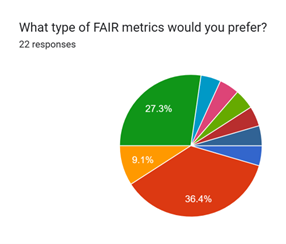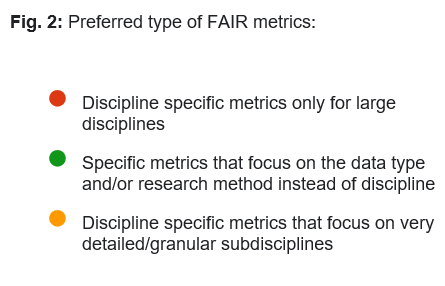As a task in the FAIR-IMPACT project, we have been collecting discipline specific metrics for the social sciences in order to allow for discipline specific FAIR evaluations using the F-uji tool (FAIR means that a research output is Findable, Accessible, Interoperable and Reusable).
As the FAIR principles are quite broad and can be interpreted in different ways, community or discipline specific metrics are necessary to define specific understandings of FAIRness and, for example, to check data sets for compliance with these metrics.
We have collected with the help of a survey a number of perceived challenges with the collection of discipline specific FAIR metrics, as well as the necessity of these and how they should be implemented.
The survey was open for responses from November 2024 to January 2025. In that time, a total of 29 responses have been collected. This number is lower than we have hoped for, but considering the very specific topic of the questionnaire not very surprising.
We received replies to our survey from a diverse group of professionals, including IT specialists, high-performance computing experts, data specialists, and researchers. Participants represented a broad spectrum of experience levels, with tenure ranging from less than five years to over fifteen years, distributed relatively evenly across this range.
Familiarity with FAIR principles was notably high among respondents, with all participants indicating awareness of the concept, and 73.1% actively applying these principles in their work. Additionally, 68% reported using at least one FAIR assessment tool. The primary motivations for employing these tools were to enhance the FAIRness of their own datasets (54.2%), ensure datasets met minimum standards for research projects (29.2%), and evaluate the FAIRness of repositories (25%).
Despite this engagement, only 36.4% of respondents had encountered discipline-specific FAIR metrics. The survey noted that such metrics were most prominent within the Social Sciences and Humanities (SSH), a likely outcome of targeted outreach through the CESSDA mailing list. Respondents emphasized the importance of developing discipline-specific metrics through a bottom-up approach led by researchers and research support staff. They preferred organic adoption (with 45.5%) over mandating uptake.

Fig. 1: Responses to the survey show that responsibility is expected to mainly lie with RDM support staff and big research clusters.
The survey further explored accountability for implementing discipline-specific FAIR metrics (see Fig. 1). Research support staff were identified as the primary stakeholders (72.7%), followed by large research clusters (59.1%), research groups (54.5%), and individual researchers (22.7%). These metrics, participants suggested, should be broadly applicable across various levels of organization, including international initiatives such as ESFRIs and ERICs (72.7%), national initiatives (59.1%), institutions (59.1%), projects (45.5%), and sub-disciplines (31.8%).
Limited capacity for working with FAIR metrics was identified as a significant barrier. Two-thirds of respondents reported having no allocated time for this work, while 22.7% had only a quarter of their work time available for FAIR-related activities. Time constraints (61.9%), financial limitations (38.1%), and a lack of relevant skills (33.3%) were the primary challenges to achieving consensus on discipline-specific metrics, which indicates an investment by infrastructures / research groups / governmental agencies is needed to increase the uptake of discipline specific metrics. Furthermore, 38.1% of respondents noted that the diversity within disciplinary groups complicated consensus-building efforts.


Preferences for the type of FAIR metrics varied (see Fig. 2). While 36.4% favored developing metrics tailored to large disciplines, a surprisingly large group of 27.3% advocated for metrics focusing on specific data types or research methods over discipline specific metrics. A smaller proportion (9.1%) supported creating highly detailed metrics for sub-disciplines.
In summary, the findings highlight a strong engagement with FAIR principles across diverse professional groups but underscore challenges related to the development and implementation of discipline-specific metrics, specifically named are the lack of resources (e.g. time and money). Recommendations are still including fostering a collaborative, bottom-up approach to metric development, increasing resource allocation, and tailoring metrics to align with varying disciplinary and methodological needs, which stands in contrast to the overall recognized lack of resources.
The original questionnaire and responses can be found on Zenodo (https://zenodo.org/records/15081652).